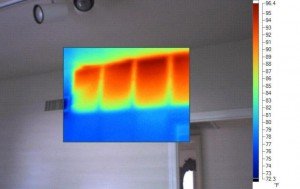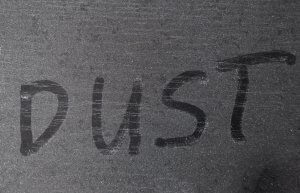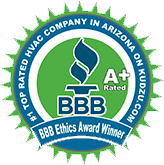Home Energy Audit – A Good Idea
Recently I was asked to write a newsletter article for a local community on the subject of Home Energy Audits. I thought our regular subscribers would like to read it as well, so here you go!

Getting a Home Energy Audit is a Good Idea for Most Homeowners
The word audit conjures up thoughts of receiving a letter from the IRS and the sleepless nights that follow. A home energy audit however is actually a good idea for most homeowners and not the least bit stressful.
Properly conducted, a home energy audit will provide you with the information you need to reduce your electric bills, make your home more comfortable, and improve the air quality inside your home.
Even if your home is newer, there may be unseen deficiencies not only costing you money, but also allowing dust and contaminants to enter your living spaces – and your lungs. A professional home energy auditor has been trained to identify construction deficiencies that often get missed by inspectors during the building process.
How Do I Know if I Should Get a Home Energy Audit?
Most people think a home energy audit is only necessary for people with high energy bills – not true. In fact, most homeowners benefit by finding out about problems in their home they didn’t even know they had.
After identifying these problems and understanding the effect they are having, an energy audit report will provide solutions for these problems.
Common Issues With Homes That Indicate the Need for a Home Energy Audit
High Utility Bills
Look at your utility bills for the last twelve months. If you don’t have these, you can contact your utility provider(s) and request copies. You can also setup online access to your account and review your year-over-year bills.
Talk to your neighbors and compare their energy costs to yours. Or, ask your utility provider how your energy bills compare to similar homes in your area. If your bills are higher than others, or if you see periods where your bills increase dramatically in certain months, an energy auditor can find out why.
If you find that your bill gets higher each year, it may not just be the rising cost of electric and/or natural gas. As homes age, construction materials degrade. Just as your car needs periodic maintenance and parts need to be replaced to keep it running well, so does your home.
Your Home is Dusty
 Excessive dust is almost always an indication of a problem. Most of us just assume since Arizona is a dusty place in general that naturally the dust inside our home is a result.
Excessive dust is almost always an indication of a problem. Most of us just assume since Arizona is a dusty place in general that naturally the dust inside our home is a result.
While some of that dust is carried in by people and pets from the outside, or when a door is opened, most is not. Or, if you thought that dust was because you have old windows, think again!
If you find yourself dusting and cleaning your floors frequently, the problem is most likely coming from inside your home! We’re not just talking about your air ducts either (although they may very well be part of the problem). Dust and other harmful airborne contaminants often enter your home through infiltration – air leaks. The largest of which are typically not through windows or doors.
Hot Spots / Cold Spots
If every room in your home is not within a degree or two of each other, there is a problem. Most homeowners automatically assume the A/C or furnace is to blame for hot rooms in the summer or cold rooms in the winter. While that may be the case, many times it is not.
Rooms with southern or western exposure may receive more sun exposure, but proper air duct design is supposed to compensate for that. Also, just because heat rises, doesn’t mean your second-floor spaces need to be uncomfortable. A well performing home, insulated properly, well-sealed, and properly ducted can maintain room temperatures to within ½ a degree of each other.
Scorpions & Other Insects
Living in the greater Phoenix metropolitan area means dealing with scorpions, black widows, and other insects most of us wish we didn’t have to. The fact of the matter is, they were here before we were.
However, what you shouldn’t have to deal with is them livinginsideyour home with you! While sealing cracks on outside walls, and making sure you have good weather stripping around your doors are a good idea, that’s not going to stop these pesky buggers.
An experienced energy auditor knows these little creatures’ tricks and can spot places they are getting inside you would’ve never even considered!
Frequent Sinus Problems / Asthma Attacks
According to the EPA, American Lung Association and many other credible sources, the air inside your home is significantly “dirtier” that the air outside.
That’s because, airborne contaminants such as dust, pet dander, pollens, and mold spores get trapped inside. Your HVAC system recirculates these contaminants into the airstream time and time again until eventually you breathe them in. Believe it or not the “tighter” the home (less air leakage), the worse the air quality in many cases.
These examples are some of the more common indications you may need a home energy audit for your home. The simple truth is the majority of homes in Arizona benefit from this process. Very rarely will an energy audit reveal there are absolutely no deficiencies in a house – even in a high-end custom-built home.
Hiring the Right Home Energy Auditor
Training / Certifications
 The US Department of Energy recognizes certifications issued by BPI (Building Performance Institute) as an indication that the energy auditor has passed the necessary written tests and field exams to properly conduct a home energy audit. The most common BPI certification is known as a BA (Building Analyst) certification.
The US Department of Energy recognizes certifications issued by BPI (Building Performance Institute) as an indication that the energy auditor has passed the necessary written tests and field exams to properly conduct a home energy audit. The most common BPI certification is known as a BA (Building Analyst) certification.
State Licensing
Arizona contractors are regulated by the AZ ROC (Registrar of Contractors). However independent energy auditors are not required to be licensed in AZ. However, it’s a good idea to hire a company that is licensed to conduct your energy audit.
Hiring a licensed contractor offers protections to homeowners you do not get if you hire an unlicensed company. It’s a good idea to hire a company that not only holds a home improvement license, but also an air conditioning contractor’s license. That’s because not only does your air conditioner play a large role in your home’s energy use and comfort, it’s also not something that should be touched by someone without the right training and experience.
Experience / Reputation
 As with any service, you probably don’t want to trust something as important as your home and health to a company that’s unproven. Choosing an energy auditor that’s been in business for a long time means they have the experience needed and probably have “seen it all before”. That experience should yield better results for you.
As with any service, you probably don’t want to trust something as important as your home and health to a company that’s unproven. Choosing an energy auditor that’s been in business for a long time means they have the experience needed and probably have “seen it all before”. That experience should yield better results for you.
What do others have to say? Read online reviews on trusted consumer websites from others who have had an energy audit completed. Check to make sure the company has no unresolved or open complaints with the AZ ROC. Also, check with your local BBB (Better Business Bureau) to make sure they are an Accredited Business, and are highly rated.
How Much Does a Home Energy Audit Cost?
The cost of a home energy audit around the country ranges anywhere from $99 to $500. In Arizona, some utility companies offer a discount through their utility rebate program. Here in Phoenix, both APS & SRP participate in a program where the homeowner only pays $99, and the utility company reimburses the energy auditing company the remainder. Only hire an approved contractor in these programs! Approved contractors have already been vetted, tested, and have the proper credentials.
What Should Be Included?
A professional energy auditor does not just walk around with a clipboard making visual observations. An energy auditor will use sophisticated tools to actually test your home. These tests include measuring home air infiltration, duct leakage, insulation issues, carbon monoxide testing, airflow testing and more.
Make sure your energy auditor will also use an infrared camera and take thermal images of your home. This is kind of like doing an x-ray of your home to see what’s going on in the walls, floor, and attic.
You should also expect your auditor use an approved energy modeling software to input all the test data into. This should require several hours of offsite work and a return visit to review the report generated. If an energy auditor is ready to present his findings then and there on the first visit, you may not be getting your money’s worth.
The energy audit report should be comprehensive and include the test results (measured readings). A thorough report will include images and a description of any deficiencies found, solutions, estimated costs of necessary improvements, and ROI (Return on Investment) estimates. The best will also include SIR (Savings to Investment Ratio) estimates. SIR estimates help to determine if the “juice is worth the squeeze” for problems with no other benefit other than energy savings.
What Can I Do Myself?
Make sure the weather-stripping around your doors and windows are in good shape. Replacing older inefficient appliances and HVAC systems are another way to reduce your energy use and carbon footprint.
Lifestyle Habits
The best thing you can do yourself is make sure you have the right habits. Are you on the right payment plan with your utility company? Do you wash clothes and do dishes during low-peak hours? Are you keeping your HVAC system maintained properly?
Discuss these things with your home energy auditor. He or she can assist you in making the most efficient lifestyle choices.
Did you enjoy Home Energy Audit – A Good Idea? You may also like:
What’s Included in a Home Energy Audit?
AC Load Calculation vs. Square Footage Rule